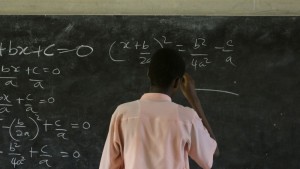Researching the politics of development
Blog

In it to win it? How powerful political elites manipulate education resources in Ghana
11 January 2016

ESID’s Abdul Gafaru Abdulai and Sam Hickey have just published their article on Ghana’s political settlement in The Journal of African Affairs. Here is a a summary of their findings:
Initial hopes that democratisation would improve prospects for development in Africa have been undermined by the sense that the adoption of democratic procedures may have actually deepened the forms of clientelist politics that are blamed for under development on the continent.
Researchers often assume that the main reason for under development is that African politicians target public resources disproportionately towards areas with the most loyal political supporters. This targeting happens as a reward for political backing and as a down payment for its continuation.
Others argue that politicians sometimes target public resources towards opposition strongholds or to ‘swing’ areas in an effort to induce them with development benefits. Resource allocation often seems aimed at maximising voter support rather than proceeding from either universalist principles or the particular needs of citizens.
Our research, however, challenges these efforts to understand the politics of public goods provisioning in Africa through the prism of voter preferences alone. Looking at the example of education in Ghana, we argue that researchers can fail to grasp the more complex workings of elite behaviour and elite–popular dynamics.
The more powerful forces that shape patterns of resource allocation flow not from regional voting patterns per se, but from the nature of the ruling coalition in power, and how regional elites are incorporated within them. Ghana has one of the highest rates of educational investment in the world, currently spending over 11 percent of its GDP and over 30 percent of the government budget on the education sector. However Ghana has long been characterised by significant regional inequalities with regards to education, with the three northern regions lagging behind in terms of income poverty and human development.
Ghana has one of the highest rates of educational investment in the world, currently spending over 11 percent of its GDP and over 30 percent of the government budget on the education sector. However Ghana has long been characterised by significant regional inequalities with regards to education, with the three northern regions lagging behind in terms of income poverty and human development.
For example, whereas more than two-thirds of adults in almost all the regions in the south have previously been to school, only about 30 percent of adults in the three northern regions have done the same. A recent UNESCO report identified the Northern Region as the most educationally deprived in Ghana, where over 60 percent of the population live in education poverty (defined as having less than four years of education). There are also substantial regional inequalities in the quality of education.
We set out to identify whether the distribution of power within ruling coalitions has direct implications for an uneven and unequal distribution of public goods that results in these regional inequalities. We use the concept of ‘holding power’ within coalitions, which refers to the capability of individuals or groups to engage and survive in conflicts over the distribution of resources.
One example is the experience of the northern regions of Ghana. Despite voting consistently for the National Democratic Congress (NDC) since 1992, they did not attract substantial per capita public education expenditures during the 1990s, as the southern Volta Region did. In addition there weren’t any concerted efforts by the ruling New Patriotic Party (NPP) to bolster its political support by channelling greater public resources to these opposition strongholds.
The disproportionate government spending in the Volta and Ashanti regions needs to be understood not simply as a product of their electoral loyalties to the NDC and NPP, respectively, but more importantly as a reflection of the holding power of political elites in these regions in relation to the respective ruling coalitions.
The role played by political elites from these regions in high-ranking government positions within different ruling coalitions is key. The regions that benefited most from the redistribution of educational expenditures during this period were also those that dominated the distribution of political power at the time, both in relation to the distribution of holding power within the broader NPP ruling coalition, and also within the education sector. Between 2003 and 2008, none of the four Ministers of Education hailed from any of the northern regions or from the Volta Region.
Our argument also reinforces Tony Killick’s discovery of ‘regularly large deviations between the estimates in the budget and the eventual actuals’, and his argument that such deviations resulted from the ability of powerful political elites to manipulate resource allocation processes in their own interests.
A further example of this inequity is the Ghana School Feeding Programme (GSFP). This was a social protection programme aimed at bridging regional inequalities in primary education by providing children with one balanced meal per day of school attendance. A crucial parliamentary by-election was at stake in the Nkoranza District at the time, and the available evidence shows that the significantly large amounts of GSFP expenditures in Brong Ahafo were channelled to this district specifically, immediately prior to the poll.
As one senior GSFP official explained, ‘They [politicians] used to lobby us a lot. If there is a by-election from any district, be rest assured that that district that time will get all the schools.’ By mid-2007, the Nkoranza District alone had 30 GSFP schools, compared with only 32 schools spread across the 18 districts in the Volta Region.
The four electoral strongholds of the NDC, namely the Volta and three northern regions, were poorly represented in the National Patriotic Party governing coalition, and consistently attracted the lowest GSFP allocations during. Our interview data helps to reveal how the inequitable distribution of GSPF spending closely reflects the unequal distribution of power within the ruling coalition via the capacity of different regional political elites to lobby for GSFP resources for their constituents.
Our research shows how, in the case of Ghana, the more privileged regions in the south have done so much better because they were much better represented in the power structure. Dominant factions within successive ruling coalitions have been able to secure higher levels of resource allocation to their regions, whilst excluding those from outside. This deployment of holding power is both enabled by and helps to reproduce the personalised and informal ways in which bureaucratic institutions and policy processes operate within clientelist political settlements.
